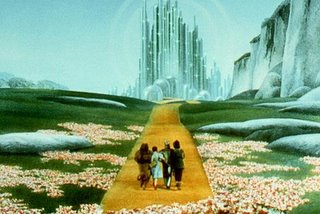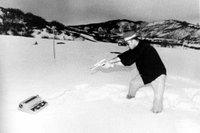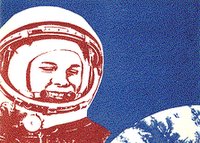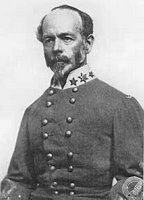The Best Part of Kansas City Is in Missouri (Need I Say More?)
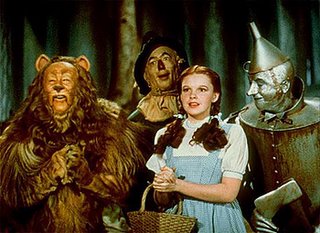
The Wizard of Oz is probably one of the few tales that qualifies as postcolonial American folklore. Disregarding true America folklore, i.e. the myths and legends of native peoples like the Cherokee and Minnetonka who preceded the carriers of guns, germs, and steel, The Wizard of Oz - along with a handful of Disney films, urban legends, and the writings of one Samuel Clemens - is a story that practically every person conceived and delivered on American soil is familiar with. Oz is culturally ubiquitous. I would bet more college PhD theses have been written in the past 20 years on The Wizard of Oz than on Moby Dick.
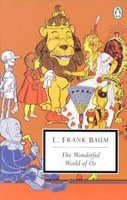 Originally, the novel was penned by L. Frank Baum and published under the title The Wonderful Wizard of Oz. Baum was the son of a New York cooper who later found success with barrels of another kind - oil barrels. Baum was a newspaperman and salesman until finding success as a children's writer.
Originally, the novel was penned by L. Frank Baum and published under the title The Wonderful Wizard of Oz. Baum was the son of a New York cooper who later found success with barrels of another kind - oil barrels. Baum was a newspaperman and salesman until finding success as a children's writer.For those unfamiliar with the story, Dorothy, the film's ingenue, is a simple country girl who wears dresses in patterened dresses and is trailed by a small terrier named Toto. Dorothy lives with her aunt and uncle - Auntie Em and Uncle Henry - on a small farm in Kansas. She is constantly at odds with her neighbor - the bellicose Miss Gulch - who tosses out threats against Toto on a daily basis. The scenes of Oz that take place in Kansas are (take note) filmed in black and white.
One afternoon, a tornado strikes and sucks up Dorothy's house and, traveling through some Kansan portal - a quantum mechanical anomaly of gyrating corn kernel positrons and plains of grain that fold upon themselves like Mobius strips - the house is delivered to the land of Oz. As Dorothy enters the wonderful world of Oz, the restored version of the film switches from black and white to color.
When Dorothy's house ascends from the tornado, it lands on the Wicked Witch of the East and Dorothy is warmly welcomed by Glinda the Good Witch and the Lollipop Guild, a ruddy group of singing dwarves. At first glance, Oz looks like a tropical Santa's workshop. Dorothy takes the ruby slippers the Wicked Witch of the East was wearing until she became casualty of Dorothy's airborne domicile and begins her journey to meet the Wizard of Oz and burden him with a request to be sent back to Kansas.

Along the way Dorothy encounters a cowardly lion, a tin man with no heart, and a scarecrow with no brain. The quintet (human, canine, metal heap, feline, and straw pile) hastily embark toward the Emerald City of Oz to meet the all-powerful wizard, more or less regarded as God.
But Oz is a strange place. The forests are alive, the monkeys avian, and the Wizard a hoax. At the movie's climax, Dorothy throws a bucket of water on the Wicked Witch of the West, melting her into a puddle of perfidious slop, and winning the applause of all Ozites. Afterward, Dorothy is once again visited by Glinda the Good Witch, who tells Dorothy she didn't need to make the journey to the Emerald City after all; the power to go back to Kansas was with Dorothy all along. Glinda tells Dorothy all she ever had to do was click her heels together and say, "There's no place like home."
And so, with some Hollywood tears in her eyes, Dorothy clicks her heels, repeats the now universal line "There's no place like home," and is instaneously teleported back to black and white Kansas where her enthusiasm for pig slop, flatlands, and manure is (suspiciously) rejuvenated.
Kansas is not only the setting of The Wizard of Oz but also the state of residence of most of my relatives. My grandmother, sister, aunt, uncle, great aunts and uncle, four first cousins, and my second and third cousins are all scattered across Kansas.
For those of you who've never been to Kansas, let me paint you a picture. Imagine a blank canvas on an easel. Now divide the canvas in half horizontally with an imaginary line. Paint the top half of the picture blue. Paint the bottom half brown.

That's Kansas. Occasionally, the blue paint from the top half will drip downward. This is called rain. Once a year, the canvas undergoes a bizarre gravity-defying evolution and brown paint from the bottom half of the canvas flows upward into the blue half. This is called agriculture. To complete the painting (and perhaps transform it into a three dimensional piece of installation art rather than a simple color scheme) scatter a few beer bottles about the legs of the easel and put a hot pan of bacon in front of an oscillating fan. That's Kansas in a multi-sensory setting.
Dorothy's quickness to utter, "There's no place like home," should not be taken at immediate face value. Through years and years of seeing Dorothy smile upon her return, The Wizard of Oz has mislead us into believing that "There's no place like home," is actually a compliment to your home. But the phrase can be applied positively and negatively. "There's no place like home," has just as much relevance if your home is a mansion in the foothills of Beverly Hills where servants massage your bunions as it does if you home is a shotgun shack where sunlight leaks in through the missing ceiling shingles and buttoning both straps on your overalls is considered "dressing up." Ergo, "There's no place like home," really doesn't say much in itself; it's a vague statement equivalent to saying, "Things here are not the same as things there." Whether the adage is supposed to make you miss your natal land for its uniqueness or make you realize how lucky you were to escape its pull is completely contingent upon the quality of life your home offers you.
Though it's probably imprudent to compare the situations I'm about to, Kansas claimed my grandfather’s life just as it did the witches mentioned above. Kansas enters Oz in the form of Dorothy's house and plop, plop there are two new plots in the Wican cemetery. Kansas enters the picture for the Swenson family and a few years later my grandfather passes away.
I vividly remember the day my grandfather died. I was sleeping in the bottom bunk of our duplex in Minnesota when my mother, just having gotten off the phone with (I presume) my grandmother, told me Papa had died of a heart attack. I was seven years old and knew what death meant. It meant that never again would Papa and I sit on the stoop of his house and carve open golf balls to get at their elastic innards and watch the tense polymer unwind and pop; it meant that I would never again, under the influence of my grandmother, drop Papa's cigarettes into the sealed off storm cellar where the abysmal darkness swallowed whatever you fed it; it meant that I would never sit on Papa's lap while he had his evening drink and watched Hee-Haw; it meant that Papa would never again make me wooden swords with his table saw and we would never again turn the hand-crank of the icecream maker together. At seven I understood the significance death, even though to this day I still seek out Papa's face in crowds. An irrational, refugee of an idea whispers lies in my ear, tells me that Papa didn't really die, telling me that Papa just ran away from home like a rascally teenager and started life anew elsewhere, somewhere far, far away from Kansas.

So when I think of Kansas, I think of the saying, "There's no place like home," which as far as Dorothy was concerned meant that Kansas was like no place on earth. I retrospect on this for a moment and I have mixed emotions. There's no other place where my grandfather died; there's no other place where I climbed the mulberry tree as a child and ate until my teeth and tongue were stained purple; there's no other place where my sister convinced me to steal from the local toy shop; there's no other place where Papa and I captured horny toads; there's no other place where I cut my foot wide open and lied to my grandmother about how it happened; there's no other place where Papa would order cranberry juice and it would arrive with a scoop of sherbet in it. Kansas is like no other place on earth - recommendation or forewarning?
I see The Wizard of Oz as a piece of American propaganda. After Dorothy kills the witches, effectively eradicates the bad seeds from the sewn land of Oz, there are really no more threats. All the intimidation in Oz is gone. It would seem as though the tornado that inadvertently brought Dorothy to Oz was really a felicitous natural disaster, because it brought her to a land of color and beauty.
Without the witches, Oz is a Utopia. Dorothy can hang out with the Tin Man, the Lion and the Scarecrow, and listen to the Lollipop Guild sing show tunes. She can bask in the radiance of the Yellow Brick Road or chat with Glinda the Good Witch.
But Dorothy doesn’t stay in Oz. She goes back to Kansas. She trades in a world of rainbows, magic and mystery for a frumpy state that's neither Southern nor Mid-Western, where people drink far too much, make racist comments without batting an eye, and still see things in black and white similarly to the way they did in 1939. It's almost as though L. Frank Baum anticipated the dementia that accompanied Judy Garland's later addiction to alcohol when he wrote Dorothy as someone who would rather return to an impoverished hog farm and continue to be tormented by her wicked neighbor than live in a world of fantastic opportunity, peace, and prosperity.
Prosperity, or the lack thereof, is the probably what most bothers me about Kansas, and returning to the state over Thanksgiving only further cemented my impression of Kansas as a dead end. Kansas is a place where people go to die, if not physically then teleologically, which is to say Kansas is a place where people put their dreams to rest.
After Dorothy taps her heels, she seemingly wakes up from a nap, giving the impression that she was merely dreaming of a place as perfect as Oz. When Dorothy returned to Kansas, Oz became nothing more than a fading memory, an impression she wasn't quite sure was real or not. When people resign themselves to stay in Kansas, undergo a similar mental process; they retire their dreams to eternal limbo, wondering whether or not those dreams were ever realizable in the first place.
I wish all of my relatives in Kansas would come to Oz. Everyone who leaves breaks the rut. Everyone who leaves realizes that Dorothy pissed in the wind by going back to the Sunflower State. Everyone who leaves realizes there's more sun and flowers outside Kansas than there are inside. By going back to Kansas, Dorothy is throwing away something really great. She is throwing away the Emerald Cities. She is throwing away the Yellow Brick Roads. She is throwing away the away ROY G BIV of the rainbow. And for what? Roadkill, grain silos and Budweiser Select?
I’m writing this piece not to offend anyone who lives in Kansas and likes it (New Mexico has plenty of faults too), I'm writing it out of concern for my sister, my cousins, and my nieces, all bright, beautiful, and capable girls/women.
 I want them to get away from Kansas, because just as a goldfish can only grow in direct ratio to the size of its fish bowl, a person can only grow as much as their surroundings allow them. A fish in a small bowl will stay small. And what you don't get to see in The Wizard of Oz is Dorothy's self-reproach for leaving Oz behind. The credits roll and we're left to assume that a happy ending ensues. But ten years down the road, is Dorothy really happy she chose hard-labor Kansas over happy-go-lucky Oz? I think not. Dorothy stayed small. She never grew. She jumped out of the ocean and into a tiny fish bowl.
I want them to get away from Kansas, because just as a goldfish can only grow in direct ratio to the size of its fish bowl, a person can only grow as much as their surroundings allow them. A fish in a small bowl will stay small. And what you don't get to see in The Wizard of Oz is Dorothy's self-reproach for leaving Oz behind. The credits roll and we're left to assume that a happy ending ensues. But ten years down the road, is Dorothy really happy she chose hard-labor Kansas over happy-go-lucky Oz? I think not. Dorothy stayed small. She never grew. She jumped out of the ocean and into a tiny fish bowl.The deeper message here is not that Kansas is a shit hole, but rather that one should not trade in a world of color for a world of the simple black and white. True, Dorothy would have had to sacrifice a great deal to remain in Oz, but great sacrifices can lead to great happiness, and it takes great courage to make great sacrifices. Most people who don't sacrifice never overcome their regret for bartering away vibrant rainbows for cheap American nostalgia.
